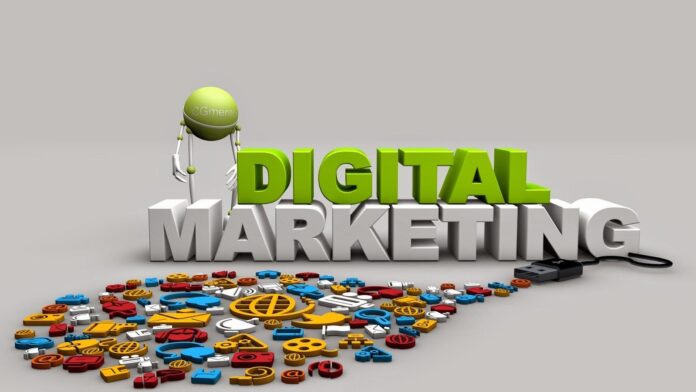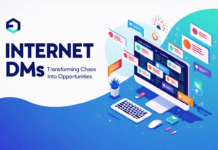In today’s fast-paced, digitally connected world, businesses must evolve to keep up with changing consumer behaviors and expectations. Enter digital marketing, a transformative force reshaping how companies reach, engage, and retain their customers.
This article delves into the nuances of digital marketing, contrasting it with traditional methods and exploring its multifaceted benefits.
Key Takeaways
- Digital marketing utilizes electronic devices and the internet to connect with customers, offering precision targeting and measurable results.
- It has significant advantages over traditional marketing, such as adaptability, cost-effectiveness, and higher ROI.
- Businesses can leverage digital marketing to expand brand awareness, engage specific audiences, and build strong customer relationships.
- Ongoing analysis and the use of KPIs help organizations optimize their strategies for growth and ensure effective digital marketing efforts.
- The future of marketing includes AI, personalization, voice search, influencers, and the need for brands to adapt to the evolving landscape.
By understanding the diverse types of digital marketing and how to leverage them effectively, businesses can achieve remarkable growth and sustainability.
What is Digital Marketing? A Modern Marketing Powerhouse
Digital marketing encompasses all marketing efforts that utilize electronic devices and the internet. Businesses leverage digital channels such as search engines, social media, email, and websites to connect with current and prospective customers. This modern approach to marketing is a powerhouse because it offers unparalleled reach, precision targeting, and measurable results.
Traditional Marketing vs. Digital Marketing: A Changing Landscape
Traditional marketing methods, such as print ads, billboards, and TV commercials, once dominated the advertising world. However, the digital era has ushered in a new landscape. Unlike traditional marketing, which often casts a wide net hoping to capture a segment of the audience, digital marketing is highly targeted. It allows businesses to reach specific demographics, track their behavior, and adjust strategies in real-time. This adaptability makes digital marketing more efficient and cost-effective, providing businesses with a higher return on investment.
The Benefits of Digital Marketing Services
Reaching New Heights: Expanding Brand Awareness and Audience Reach
Digital marketing enables businesses to extend their brand’s reach far beyond geographical boundaries. Through social media, search engines, and email marketing, companies can connect with a global audience, increasing brand visibility and awareness. Effective digital strategies help brands become household names in diverse markets.
Targeted Engagement: Connecting with the Right Customers at the Right Time
One of the most significant advantages of digital marketing is the ability to target specific segments of the audience. By utilizing data analytics, businesses can understand their customers’ preferences and behaviors. This knowledge allows for personalized marketing efforts that reach the right people at the right time, enhancing engagement and conversion rates.
Measurable Results: Tracking Success and Maximizing ROI (Return On Investment)
Digital marketing provides quantifiable metrics that allow businesses to track the performance of their campaigns. Tools like Google Analytics and social media insights offer detailed reports on user interactions, conversion rates, and ROI. This data-driven approach enables companies to refine their strategies continuously, ensuring optimal results and efficient use of resources.
Building Relationships: Fostering Brand Loyalty and Customer Advocacy
Digital marketing is not just about acquiring new customers; it’s also about nurturing existing ones. Through personalized email campaigns, engaging social media interactions, and responsive customer service, businesses can build strong relationships with their audience. Loyal customers often become brand advocates, spreading positive word-of-mouth and driving further growth.
Staying Ahead of the Curve: Embracing Innovation and Future Trends
The digital marketing landscape is ever-evolving, with new technologies and trends emerging regularly. By staying abreast of these changes, businesses can maintain a competitive edge. Embracing innovations such as artificial intelligence, voice search, and chatbots ensures that marketing strategies remain effective and relevant in a dynamic market.
Exploring the Diverse Types of Digital Marketing
Content is King: Crafting Compelling Content that Converts
High-quality content is the cornerstone of effective digital marketing. It not only attracts visitors but also converts them into loyal customers.
Blog Posts: Informative Articles and Engaging Stories
Blogs are a powerful tool for sharing knowledge and building authority in your industry. Well-researched, informative articles engage readers and drive traffic to your website, enhancing SEO and establishing your brand as a thought leader.
eBooks and Whitepapers: Establishing Expertise and Thought Leadership
eBooks and whitepapers delve deeper into specific topics, providing in-depth insights and solutions. They are excellent resources for generating leads, as they often require users to provide contact information in exchange for access.
Infographics and Visual Content: Simplifying Complex Ideas
Infographics and other visual content distill complex information into easily digestible formats. They capture attention quickly and are highly shareable, making them effective for increasing brand visibility.
Video Marketing: Reaching Audiences with Powerful Storytelling
Video marketing leverages the power of visual storytelling to engage audiences. Videos can explain products, share customer testimonials, or provide tutorials, making them versatile tools for various marketing goals.
Search Engine Optimization (SEO): The Art of Getting Found Online
SEO is critical for ensuring your content is discoverable by search engines and users. It involves optimizing your website and content to rank higher in search results, driving organic traffic.
Keyword Research: Unlocking the Secrets of Search Queries
Effective SEO begins with keyword research. By understanding the terms and phrases your target audience uses, you can create content that aligns with their search intent, increasing your chances of being found online.
On-Page Optimization: Tailoring Your Website for Search Engines
On-page optimization involves refining your website’s content and structure. This includes using relevant keywords, optimizing meta tags, and ensuring a mobile-friendly design to improve search engine rankings.
Off-Page Optimization: Building Backlinks and Domain Authority
Off-page optimization focuses on external factors like backlinks, which are links from other websites to yours. Quality backlinks boost your site’s authority and improve its ranking on search engines.
Local SEO: Reaching Customers in Your Neighborhood
Local SEO targets customers in your geographic area. By optimizing your website for local search terms and managing your business’s online listings, you can attract nearby customers who are ready to purchase.
Social Media Marketing: Building Communities and Driving Engagement
Social media marketing involves creating and sharing content on platforms like Facebook, Twitter, and Instagram to engage your audience and build a community around your brand.
Building a Strong Social Media Presence: Identifying the Right Platforms
Not all social media platforms are created equal. Identifying which ones your target audience frequents allows you to focus your efforts where they are most likely to yield results.
Content Strategy for Social Media: Engaging Posts and Effective Scheduling
A well-planned content strategy ensures that your social media posts are consistent, engaging, and aligned with your brand’s voice. Scheduling tools can help maintain a regular posting cadence, maximizing audience engagement.
Social Media Advertising: Paid Promotions for Targeted Reach
Paid social media advertising allows for precise targeting based on demographics, interests, and behaviors. This ensures your ads reach the most relevant audience, enhancing their effectiveness.
Community Management: Fostering Positive Interactions and Brand Advocacy
Effective community management involves engaging with your audience, responding to comments and messages, and fostering a positive brand image. This builds trust and loyalty among your followers.
Pay-Per-Click (PPC) Advertising: Reaching Targeted Users at the Right Moment
PPC advertising involves paying for ad placements on search engines or social media platforms. You bid on keywords relevant to your business, ensuring your ads appear when users search for those terms.
Keyword Research for PPC: Identifying Profitable Keywords
Identifying the right keywords is crucial for a successful PPC campaign. This involves finding terms with high search volume and low competition, ensuring you get the most value from your ad spend.
Creating Compelling Ad Copy: Enticing Users to Click
Effective ad copy is clear, concise, and compelling. It highlights the benefits of your product or service and includes a strong call-to-action, encouraging users to click on your ad.
Landing Page Optimization: Converting Clicks into Sales or Leads
A well-designed landing page is essential for converting ad clicks into sales or leads. It should be relevant to the ad, easy to navigate, and include a clear call-to-action.
Campaign Management and Budget Optimization
Effective campaign management involves monitoring your PPC ads, adjusting bids, and optimizing your budget to maximize ROI. Continuous analysis and tweaking ensure the best performance.
Choosing the Right Digital Marketing Services for Your Business
Identifying Your Business Goals: What Do You Want to Achieve?
Clearly defining your business goals is the first step in choosing the right digital marketing services. Whether you aim to increase brand awareness, generate leads, or boost sales, knowing your objectives guides your strategy.
Understanding Your Target Audience: Who Are You Trying to Reach?
A deep understanding of your target audience’s demographics, preferences, and behaviors is crucial. This knowledge allows you to tailor your marketing efforts to resonate with your ideal customers.
Evaluating Your Budget: Finding the Perfect Fit for Your Resources
Budget considerations play a significant role in your digital marketing strategy. It’s essential to find a balance between your financial resources and the services that will deliver the best results.
Working with a Digital Marketing Agency: Leveraging Expertise and Scalability
Partnering with a digital marketing agency provides access to specialized knowledge and skills. Agencies can offer scalable solutions and the latest industry insights, ensuring your marketing efforts are both effective and up-to-date.
In-House Digital Marketing Team vs. Outsourcing: Exploring Your Options
Deciding between an in-house team and outsourcing depends on your business’s specific needs and resources. In-house teams offer greater control and direct collaboration, while outsourcing can provide broader expertise and flexibility.
Measuring the Success of Your Digital Marketing Efforts
Key Performance Indicators (KPIs): Tracking What Matters Most
KPIs are essential metrics that help track the effectiveness of your digital marketing efforts. Common KPIs include website traffic, conversion rates, and customer acquisition costs, which provide insights into your campaign’s performance.
Website Analytics: Unveiling User Behavior and Preferences
Website analytics tools, such as Google Analytics, reveal how users interact with your site. This data helps you understand user behavior, identify popular content, and uncover areas needing improvement.
Social Media Analytics: Measuring Engagement and Reach
Social media analytics track engagement metrics like likes, shares, and comments. These insights help gauge the effectiveness of your social media strategy and identify which types of content resonate most with your audience.
Conversion Tracking: Assessing the Effectiveness of Your Campaigns
Conversion tracking measures how many users take desired actions on your website, such as making a purchase or signing up for a newsletter. This metric is crucial for understanding the direct impact of your digital marketing campaigns and optimizing them for better performance.
Data-Driven Decisions: Optimizing Your Strategy for Continued Growth
Utilizing data analytics allows businesses to make informed decisions. By continuously analyzing data from various digital marketing efforts, companies can identify trends, understand customer preferences, and adjust strategies to maximize growth and ROI.
The Future of Digital Marketing: Embracing New Trends and Technologies
The Rise of Artificial Intelligence (AI) in Marketing
AI is revolutionizing digital marketing by enabling personalized customer experiences at scale. AI-driven tools can analyze vast amounts of data to predict customer behavior, automate marketing tasks, and deliver highly targeted content, making marketing efforts more efficient and effective.
Personalization and Customer Experience Optimization
Personalization is becoming increasingly important in digital marketing. Tailoring content, offers, and communications to individual customers based on their preferences and behavior enhances the customer experience, fosters loyalty, and increases conversion rates.
The Growing Importance of Voice Search and Chatbots
Voice search and chatbots are transforming how consumers interact with brands. Optimizing content for voice search can improve visibility and accessibility, while chatbots provide instant, personalized customer service, enhancing user satisfaction and engagement.
The Power of Influencer Marketing and Social Commerce
Influencer marketing leverages the reach and trust of social media influencers to promote products and services. Social commerce, the integration of e-commerce and social media, allows users to shop directly within social platforms, streamlining the purchase process and boosting sales.
Adapting to the Ever-Evolving Digital Landscape
The digital marketing landscape is in constant flux, with new technologies, platforms, and consumer behaviors emerging regularly. Staying ahead requires agility, continuous learning, and a willingness to experiment with new strategies and tools to remain relevant and competitive.
Conclusion
The Power of Digital Marketing: A Strategic Advantage for Your Business
Digital marketing is a powerful tool that offers businesses a strategic advantage in today’s competitive landscape. By leveraging digital channels and tools, companies can reach a broader audience, engage with customers more effectively, and achieve measurable results.
Taking the Next Step: Implementing a Successful Digital Marketing Strategy
Implementing a successful digital marketing strategy involves understanding your business goals, identifying your target audience, and selecting the right mix of digital marketing services. Whether working with an agency or building an in-house team, focusing on data-driven decisions and staying current with industry trends will ensure your marketing efforts drive continued growth and success.











